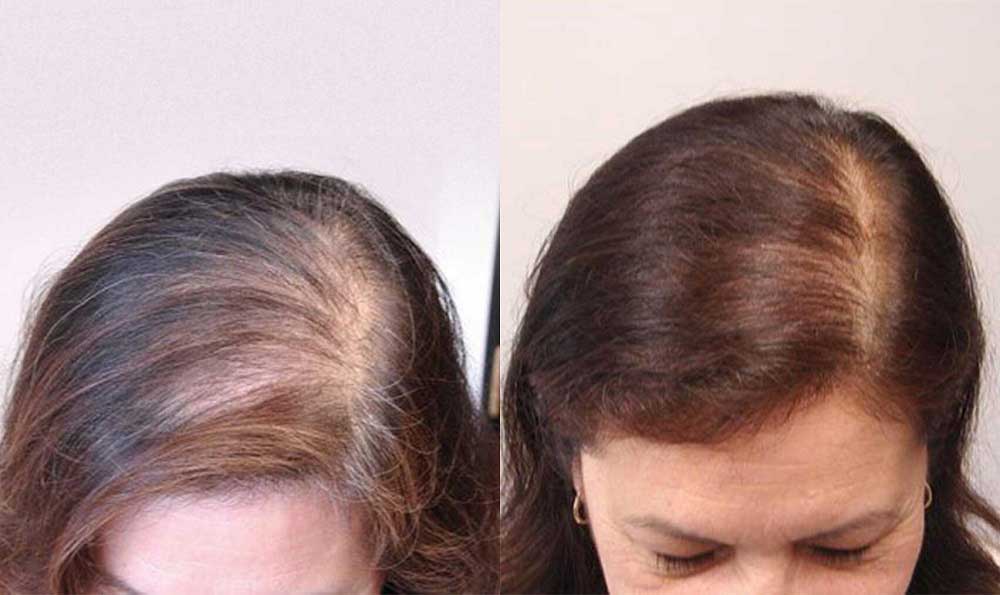Table Of Content
- How do dermatologists find out what’s causing hair loss?
- Health Alerts from Harvard Medical School
- Our 7 Picks For Where To Get The Best Hair Loss Treatments
- Frequently asked questions about hair loss treatments
- About Mayo Clinic
- What is the difference between telogen effluvium and female pattern baldness?

An older review from 2015 notes that using certain types of medicated shampoos may also help reduce and prevent hair loss. Avoiding damaging treatments such as heat, curling irons, and dyes may also help. Other possibilities include antiandrogen medications, such as spironolactone. Androgens are hormones that can speed up hair loss in some women, particularly those with polycystic ovary syndrome, who typically produce more androgens. While the instinct may be to choose the stronger solution, this is not always necessary. Research from 2018 and 2017 found that 2% minoxidil was effective for people with androgenetic alopecia or pattern baldness.
How do dermatologists find out what’s causing hair loss?

But finding the right formula isn't a matter of simply choosing a product off the shelf and hoping that it works. First, it helps to understand what’s causing your hair changes. While both are clinically proven to show results in three to six months, neither should be used if you are pregnant or breastfeeding. A large body of research has shown that these over-the-counter creams and foams, applied to the scalp daily, are effective at stimulating hair growth, increasing hair density and halting hair loss over time. Most users see results after consistent use for about two months. If you often wear a hairstyle like braids or a tight bun that puts prolonged strain or stress on the hair follicle, that can cause a type of permanent hair loss called traction alopecia.
Health Alerts from Harvard Medical School
Some conditions causing temporary hair loss will resolve themselves without treatment, or with a few lifestyle changes. If getting the right nutrients, minimizing stress, and avoiding tight hairstyles don’t seem to help, a doctor or dermatologist can offer more information on prescription treatments. If you’ve noticed signs of female pattern baldness, know you’re far from alone. According to the American Osteopathic College of Dermatology (AOCD), this condition is common in women, especially after menopause.
Our 7 Picks For Where To Get The Best Hair Loss Treatments
Looking for a hair regrowth product you can apply and then forget about? BosleyMD’s Healthy Hair & Scalp Follicle Energizer might be what you need. The serum is lightweight (so you don’t have to worry about your hair feeling greasy), prescription-free, and contains ingredients to reduce scalp inflammation and blood circulation to boost hair growth. A 2021 review of 15 studies — including several large randomized control trials that are the gold standard for medical research — found that laser therapy increased hair count in both men and women. You can either purchase over-the-counter laser devices to use at home or receive the treatments from a provider. Here, dermatologists share what you need to know about alopecia, including possible causes, treatment options and what you can do to prevent more hair loss.
Frequently asked questions about hair loss treatments
This medication, which comes in the form of shampoo, is an antifungal agent that may help reduce your body’s production of testosterone and other androgens that lead to hair loss. You can also find 1% strength at your local pharmacy, but it may not be as effective. You can often resolve nutrient deficiencies with dietary changes or supplements, though it never hurts to get guidance from a doctor or registered dietitian first. A trained healthcare professional can help identify and treat nutrient deficiencies caused by an underlying medical condition.
About Mayo Clinic
Which Hair Growth Products Are Worth Using? - Health Hive
Which Hair Growth Products Are Worth Using?.
Posted: Wed, 21 Feb 2024 08:00:00 GMT [source]
For conditions like alopecia areata that may affect children as well as adults, groups can provide emotional support and even help you buy wigs or find other ways to cope. Studies indicate that this medication is effective in about 40% for women who have female pattern hair loss. In one study of 166 women taking spironolactone, 42% said they had mild improvement, and 31% reported increased thickness. The FDA has approved topical tretinoin cream and gel for skin care and supportive pro-aging purposes, but not for hair loss treatments. In some circumstances, tretinoin may cause hair loss, so it’s important to only try this medication with guidance from your doctor. These FDA-cleared devices use laser energy to directly revitalize and stimulate hair follicles, working to promote the growth of new healthy hair with low-level laser therapy (LLLT).
The role of vitamins and minerals in hair health: Essential nutrients for strong and healthy hair
“These medications help suppress the immune system’s overactivity and encourage hair regrowth,” Dr. Mitchell explains. The FDA also recently approved a new drug for severe cases of alopecia areata called Litfulo (generic name, ritlecitinib). The medication stimulates hair growth by quieting part of the immune system.
An unwarranted haircut or color could bring up feelings of inadequacy. Braids or protective styles could lead to exterior unprofessionalism, leading to loss of jobs or missed opportunities. Short hair can allude to boldness for going against the age-old stereotype that women are to have long hair.
This solution contains 2% minoxidil, the only FDA-approved topical ingredient to deal with hair loss. The only problem is that it’s totally up in the air as to when or how this will happen. “The only thing predictable about alopecia areata is that it’s unpredictable,” says Dr. Piliang.
Sometimes, your hair will regrow on its own, making treatment unnecessary. For example, a woman may have had a baby a few months ago, and this may be causing obvious hair shedding. She may also have early hereditary loss, which isn’t so obvious. If your dermatologist suspects that the cause of your hair loss could be a disease, vitamin deficiency, hormone imbalance, or infection, you may need a blood test or scalp biopsy.
Many people see some regrowth when using minoxidil, but it takes time to see results, usually about 6 to 12 months. Speak with a doctor about any troubling hair loss, shedding, or thinning you may be experiencing. Your doctor can help determine the cause of your symptoms and put together a treatment plan. You can receive laser therapy treatments from a dermatologist, but you can also purchase portable laser devices without a prescription.

No comments:
Post a Comment